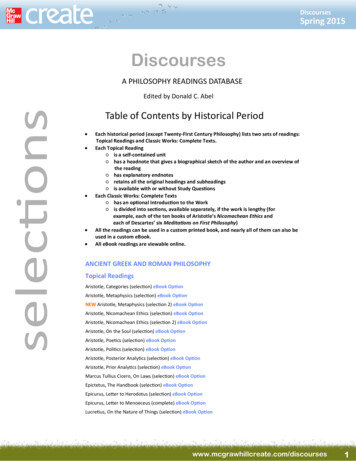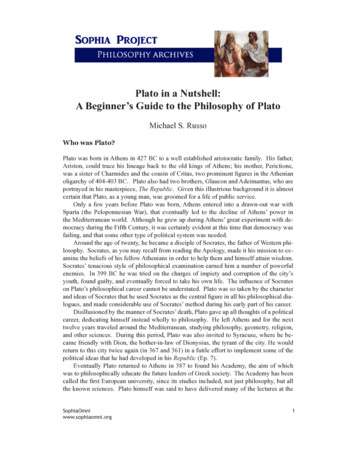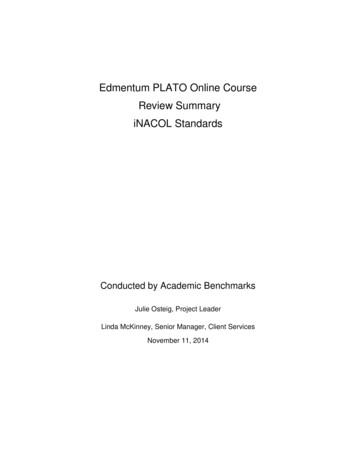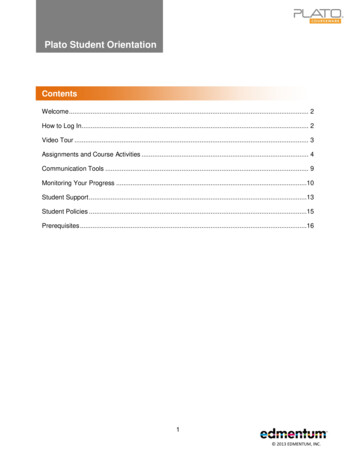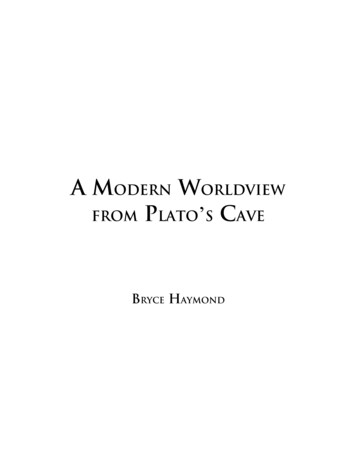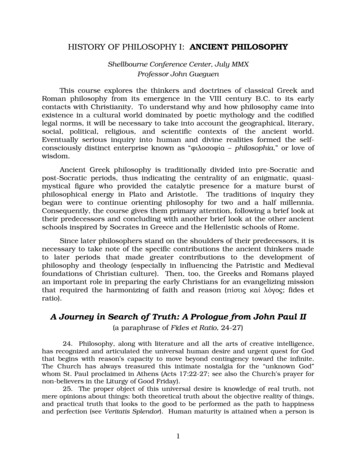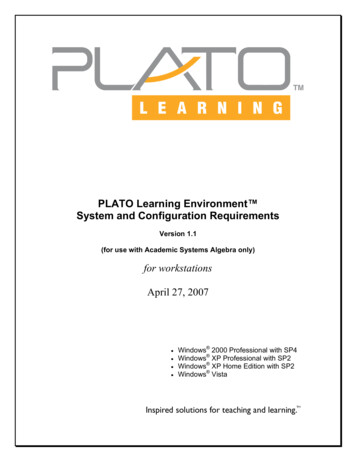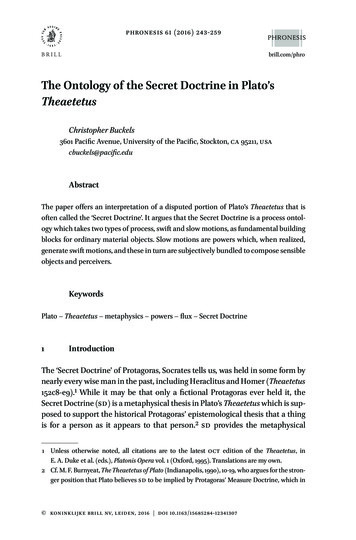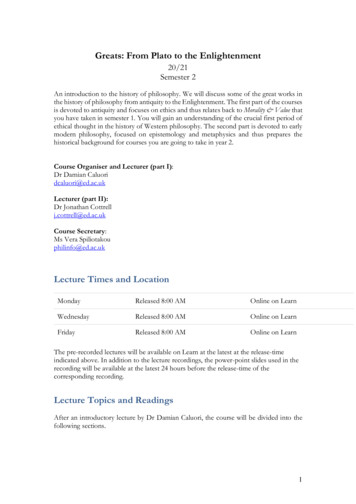
Transcription
Greats: From Plato to the Enlightenment20/21Semester 2An introduction to the history of philosophy. We will discuss some of the great works inthe history of philosophy from antiquity to the Enlightenment. The first part of the coursesis devoted to antiquity and focuses on ethics and thus relates back to Morality & Value thatyou have taken in semester 1. You will gain an understanding of the crucial first period ofethical thought in the history of Western philosophy. The second part is devoted to earlymodern philosophy, focused on epistemology and metaphysics and thus prepares thehistorical background for courses you are going to take in year 2.Course Organiser and Lecturer (part I):Dr Damian Caluoridcaluori@ed.ac.ukLecturer (part II):Dr Jonathan Cottrellj.cottrell@ed.ac.ukCourse Secretary:Ms Vera Spiliotakouphilinfo@ed.ac.ukLecture Times and LocationMondayReleased 8:00 AMOnline on LearnWednesdayReleased 8:00 AMOnline on LearnFridayReleased 8:00 AMOnline on LearnThe pre-recorded lectures will be available on Learn at the latest at the release-timeindicated above. In addition to the lecture recordings, the power-point slides used in therecording will be available at the latest 24 hours before the release-time of thecorresponding recording.Lecture Topics and ReadingsAfter an introductory lecture by Dr Damian Caluori, the course will be divided into thefollowing sections.1
I. Plato, Apology and RepublicLecturer: Dr Damian CaluoriWe will first examine Socrates’ life, presented in the Apology as a paradigmatic philosophicallife, uncompromisingly devoted to the pursuit of truth. We will ask: why should we devoteour lives to the pursuit of truth? We will then turn to the Republic, where Glauconchallenges Socrates with the common-sense view that morally bad people are perfectlycapable of having happy and successful lives. Indeed, often it may be advantageous, itappears, not to do what morality requires. To meet this challenge, Socrates develops a richand complex account of justice in both society and individual, proposes a theory ofmotivation, dives into metaphysical questions, and gives reasons to think that an idealsociety ought to be ruled by philosophers.Note: The page numbers referring to Plato’s work (e.g. “367e” in “Republic, book II, 367e”)are given according to the so-called Stephanus-pagination, found in the margins of alldecent translations of Plato. They do not refer to the page numbers of Cooper’s edition.More about this below under ‘Referencing style’ below.ApologyLecture 1: The life and death of Socrates, part I. ApologyLecture 2: The life and death of Socrates, part II. ApologyInterlude: A formative lecture on how to write an essay in philosophyLecture: How to write an essay in philosophy.RepublicLecture 3: Conceptions of justice and the benefits of being bad. Republic, book I complete Republic, book II beginning-367eLecture 4: Why humans live in communities and building a just city. Republic, book II 368a-377b; 382a-c Republic, book III 412b-endLecture 5: Education and the four virtues of the just city. Republic, book III 400c-404e Republic, book III410a-412b Republic, book IV 419a-420b Republic, book IV 427d-434dLecture 6: The tripartite soul and why it is good to be good. Republic, book IV 434d-endLecture 7: What is a philosopher and why must the just city be ruled by philosophers?2
Republic, book V 473b-endRepublic, book VI beginning-504aRepublic, book VII 519b-535aLecture 8: The theory of Forms and the Form of the Good. Republic, book VI 504a-end Republic, book VII beginning-519bReadingsAll readings can be found on our Resource List (Learn Library Resources Resource List).Core ReadingsThere are many translations of both works. We will work with the translations inJ. Cooper (ed.) Plato. Complete Works (available online). If students prefer to buy theApology and the Republic as separate volumes, I recommend: G. M. A. Grube (ed.),Plato. Five Dialogues (Hackett) and C.D.C. Reeve (ed.), Plato. Republic (Hackett).Secondary ReadingsPlato J. Annas, Plato. A Very Short Introduction. R. Kraut, https://plato.stanford.edu/entries/plato/#GenOve A. Mason, Plato. C. Meinwald, Plato.Apology T. C. Brickhouse, N. D. Smith: Socrates on Trial.M. F. Burnyeat, ‘The impiety of Socrates’.C. D. C. Reeve, Socrates in the Apology.Republic: General J. Annas, An Introduction to Plato's Republic (a bit dated, but still of interest).M. F. Burnyeat, Culture and Society in Plato’s Republic.G. Ferrari (ed.), The Cambridge Companion to Plato’s Republic.G. Santas (ed.), The Blackwell Guide to Plato’s Republic.G. Santas, Goodness and Justice. Plato, Aristotle, and the Moderns.Republic: Specific Topics C. Kirwan, ‘Glaucon’s Challenge’.L. Brown, ‘Glaucon’s Challenge’, in: Pursuing the Good.L. Hendrik, The brute within: appetitive desires in Plato and Aristotle, chps. 1-2. (Ontripartition.)M. F. Burnyeat, ‘The truth of tripartition’.G. R. F. Ferrari, City and soul in Plato’s Republic. (On the soul-city-analogy.)J. Cooper, ‘The psychology of justice in Plato’.D. Sedley, ‘Philosophy, the forms, and the art of ruling’ (in Ferrari, CambridgeCompanion to Plato’s Republic, ch. 10).3
N. Denyer, ‘Sun and line: the role of the good’ (in Ferrari, Cambridge Companion toPlato’s Republic, ch. 11).II. Aristotle, Eudemian EthicsLecturer: Dr. Damian CaluoriIn this work, Aristotle provides an answer to the question of what it means for a life to begood. In order to answer this question, Aristotle thinks, we need an account of what ahuman being is – for when we ask what a good life is, we ask what a good human life is(whatever a good life for gods or goats may be). There are some crucial aspects of humanlife that need to be considered to this end: responsibility, pleasure, friendship, and virtueare, in Aristotle’s view, among the most important.Lecture 1: Happiness Eudemian Ethics, book ILecture 2: Happiness, Function and Virtue Eudemian Ethics, book II.1-5 Eudemian Ethics, book III.1-2Lecture 3: Justice Eudemian Ethics, book IVLecture 4: Wisdom and Pleasure Eudemian Ethics, book V Eudemian Ethics, book VI.4 Eudemian Ethics, book VI.11-14Lecture 5: Voluntary action, responsibility, and decision Eudemian Ethics, book II.6-11 Eudemian Ethics, book VI.1-10Lecture 6: Friendship Eudemian Ethics, book VIIReadingsCore ReadingB. Inwood, R. Woolf, Aristotle, Eudemian Ethics (available online).Secondary ReadingsAristotle J. Ackrill, Aristotle the Philosopher. J. Lear, Aristotle. The Desire to Understand. W. D. Ross, Aristotle. C. Shields, https://plato.stanford.edu/entries/aristotle/4
Aristotle’s ethics: General S. Broadie, Ethics with Aristotle. M. F. Burnyeat, ‘Aristotle on learning to be good’. (Highly recommended.) B. Inwood & R. Woolf, ‘Introduction’, in: Aristotle, Eudemian Ethics. A. Kenny, Aristotle on the Perfect Life. A. Rorty (ed.), Essays on Aristotle’s Ethics.Aristotle’s ethics: Specific topics G. Lawrence, ‘Human excellences in character and intellect’. (On virtues.) A. Gomes-Lobo, ‘The ergon inference’. (On the function argument.) R. Polansky, ‘Giving justice its due’. (On justice.) S. Benetatos, ‘Aristotle’s notion of friendship’. (On friendship.) H. Segvic, ‘Deliberation and Choice in Aristotle’ (on decisions.)III. Descartes and Princess ElisabethLecturer: Dr Jonathan CottrellLecture 1: Introduction to Early Modern Philosophy and to Descartes Descartes, Discourse on the Method Descartes, Frontmatter to the Meditations Descartes, Preface to the Principles of PhilosophyLecture 2: From Belief, through Doubt, to Knowledge Descartes, Meditations, Meditations 1–4Lecture 3: The Real Distinction between the Mind and the Body Descartes, Meditations, Meditation 2 (re-read), Meditations 5 and 6; Arnauld and Descartes, Selections from the Objections and Replies, pp.136–144 Margaret Wilson, ‘Descartes: The Epistemological Argument for Mind-BodyDistinctness’Lecture 4: The Union of the Mind and the Body Descartes, Meditations, Meditation 6 (re-read) Descartes and Elisabeth, Correspondence, pp.61–73 (up through Elisabeth’sletter of 1st July 1643)Lecture 5: Happiness and Virtue Descartes and Elisabeth, Correspondence, pp.85–122 (read up throughDescartes’s letter of 6th October 1645)Lecture 6: The Passions Elisabeth, letter of 13th September 1645 (Correspondence, pp.109–111); Descartes, letter of 6th October 1645 (Correspondence, pp.115–122);5
Descartes, Passions of the SoulElisabeth, letter of 25th April 1646 (Correspondence, pp.132–134);Descartes, letters A and B of May 1646 (Correspondence, pp.134–138)Lecture 7: Free Will Descartes, Meditations, Meditation 4 (re-read) Descartes and Elisabeth, Correspondence, pp.106–132 (read up throughDescartes’s letter of January 1646)ReadingsCore Readings Descartes, René. Meditations on First Philosophy with Selections from the Objections andReplies. Second Edition. Edited by J. Cottingham. (Cambridge: CambridgeUniversity Press, 2017)Available online: 89F724981000827E1B2674169C934 Princess Elisabeth of Bohemia and René Descartes. The Correspondence betweenPrincess Elisabeth of Bohemia and René Descartes. Edited and Translated by LisaShapiro. (Chicago and London: University of Chicago Press, 2007)Available online: tion?docID 408505 Secondary ReadingsOn Descartes’s Meditations: Cottingham, John. General Introduction. In R. Descartes, Meditations on FirstPhilosophy with Selections from the Objections and Replies. Williams, Bernard. Introductory Essay. In R. Descartes, Meditations on FirstPhilosophy with Selections from the Objections and Replies. Wilson, Margaret. Descartes. (London: Routledge, 1978)o Available online: https://www.taylorfrancis.com/books/9780203167670 On the Descartes–Elisabeth Correspondence: Broad, Jacqueline. Women Philosophers of the Seventeenth Century, Chapter 1.(Cambridge: Cambridge University Press, 2003)o Available online: tion?pqorigsite primo&docID 202217 Garber, Daniel. ‘Understanding Interaction: What Descartes Should Have ToldElisabeth’, Southern Journal of Philosophy, supp. 21 (1983): 15–37 Shapiro, Lisa. Volume Editor’s Introduction. In The Correspondence between Princessof Elisabeth of Bohemia and René Descartes.6
Shapiro, Lisa. ‘Princess Elisabeth and Descartes: The Union of Soul and Bodyand the Practice of Philosophy’. British Journal for the History of Philosophy 7, no. 3(1999): 503–20.IV. Anton Wilhelm AmoLecturer: Dr Jonathan CottrellLecture 1: Amo’s Philosophy: Context and Background (Amo) Amo, On the Apatheia of the Human Mind William E. Abraham, ‘Anton Wilhelm Amo’ Justin E. H. Smith, ‘Anton Wilhelm Amo’Lecture 2: The Nature of Spirit (Amo) Amo, On the Apatheia of the Human Mind, Ch. 1 (re-read)Lecture 3: Sensation and the Mind-Body Relation (Amo) Amo, On the Apatheia of the Human Mind, Ch. 2 (re-read)ReadingsCore ReadingsAmo, Anton Wilhelm. Apathy of the Human Mind. In ‘Latin-to-EnglishTranslation of Anton Wilhelm Amo’s Apathy of the Human Mind’. Edited andTranslated by Dwight K. Lewis, Jr.Available online: https://dwightlewis.academia.edu/research Secondary Readings Lewis, Dwight K. ‘Anton Wilhelm Amo’s Philosophy and Reception: from theOrigins through the Encyclopédie’, excerpt.o Available online: https://dwightlewis.academia.edu/research Lewis, Dwight K. ‘Anton Wilhelm Amo: The African Philosopher in EighteenthCentury Europe’ (2018). Published online: URL m-amo-the-africanphilosopher-in-18th-europe/ Smith, Justin E. H. Nature, Human Nature, and Human Difference. Introduction andChapter 8. (Princeton: Princeton University Press, 2015)o Available online: tion?docID 2002152 V. David HumeLecturer: Dr Jonathan CottrellLecture 1: Hume’s “Chief Argument” (Hume)7
Hume, Treatise, Book 1, Part 3, Sections 1–3Hume, AbstractHume, A Letter from a Gentleman to his Friend in EdinburghLecture 2: Sceptical Doubts and a Sceptical Solution (Hume) Hume, Abstract (re-read) Hume, first Enquiry, §§4, 5, and 12Lecture 3: Causation, Necessary Connection, and Free Will (Hume) Hume, first Enquiry, §§7 and 8ReadingsCore ReadingsHume, David. An Enquiry concerning Human Understanding. Oxford World’sClassics Edition. Edited by Peter Millican. (Oxford: Oxford University Press,2007)Available online: st/detail/detail?vid 0&sid r03&bdata JnNpdGU9ZWhvc3QtbGl2ZQ%3d%3d#AN 216022&db nlebk Secondary Readings Beebee, Helen. Hume on Causation. (London: Routledge, 2006) Garrett, Don. Cognition and Commitment in Hume’s Philosophy. (Oxford: OxfordUniversity Press, 1997) Millican, Peter. Introduction and Notes. In D. Hume, An Enquiry concerningHuman Understanding. Millican, Peter. ‘The Context, Aims, and Structure of Hume’s First Enquiry. InReading Hume on Human Understanding, edited by P. Millican. (Oxford: OxfordUniversity Press, 2002), pp.27–65.o Available online: 2002 Chapter1.pdf VI. Lady Mary ShepherdLecturer: Dr Jonathan CottrellLecture 1: The Causal Maxim (Shepherd) Hume, Treatise, Book 1, Part 3, Section 3 (re-read) Shepherd, Essay, Advertisement, Ch. 1, and Ch. 2, §1Lecture 2: The Course of Nature (Shepherd)8
Hume, Enquiry, §4 part ii (re-read)Shepherd, Essay, Ch. 2 (re-read §1 and finish the chapter)Lecture 3: Definitions of A Cause (Shepherd) Hume, Enquiry, §7 part ii (re-read) Shepherd, Essay, Ch. 2 §3 (re-read), Ch. 4, Ch. 6 §§4 and 6ReadingsCore ReadingsShepherd, Mary. Lady Mary Shepherd: Selected Writings. Edited by Deborah Boyle.(Exeter: Imprint Academic, 2018)Available online: tion?pqorigsite primo&docID 5647591Secondary Readings Atherton, Margaret. ‘Reading Lady Mary Shepherd’. The Harvard Review ofPhilosophy 13(2) (Fall 2005), pp.73–85 Bolton, Martha. ‘Mary Shepherd’. The Stanford Encyclopedia of Philosophy (Winter2017 Edition), Edward N. Zalta (ed.), URL s/mary-shepherd/ . Landy, David. ‘A Defense of Shepherd’s Account of Cause and Effect asSynchronous’. Journal of Modern Philosophy 2(1) (2020), URL https://jmphil.org/articles/10.32881/jomp.46/ LoLordo, Antonia. ‘Mary Shepherd on Causation, Induction, and Natural Kinds’.Philosophers’ Imprint 19 (2019), URL 2/1 VII. Concluding LectureLecturer: Dr Jonathan CottrellLecture: The Standard Story of Early Modern PhilosophyNo new reading assignmentLecture notes and other materials will be available on Learn.Further advice on ReadingsEncyclopaedias are a very good source of extra reading. Avoid Wikipedia (it is ofteninaccurate on philosophy) but there are good internet encyclopaedias that can be useful:The Stanford Encyclopedia of Philosophy (SEP)The Internet Encyclopedia of Philosophy (IEP)WebsitesWe also recommend the following as starting points for your research:9
PhilPapersPhilosophy CompassThe Diversity Reading ListYou will need to know how to track down sources, including electronic journals, using thelibrary search engine DiscoverED.TutorialsIn addition to three course lectures per week, you will have weekly tutorials. Tutorials willtake place, at times and places to be arranged, during weeks 2 through 11 of the semester.Some tutorials will be in-person, and some will be online.Attendance at tutorials is obligatory for all students on this course, and you have to attendthem. Attendance will be greatly beneficial for deepening your understanding of thematerials and for asking questions and discussing them with your tutor and your fellowstudents. They are also a good opportunity to meet other students (be it in person oronline) and thus have an important social function.You will be allocated a suitable tutorial group by the Timetabling Department based onyour timetable. Should you wish to change the group you have been allocated to, you willneed to fill in the Tutorial Group Change form on the Timetabling Department’s webpage.Please inform your tutor and the Teaching Office of any absences. Students who misstutorials may be required to do additional written work.AssessmentThis course will be examined based on two essays and five quizzes:QuizzesThe five quizzes count for 5% of the overall assessment mark. They test your understanding ofthe content of one lecture each. The deadlines are as follows:Quiz 1 27 January at noon.Quiz 2 3 February at noon.Quiz 3 10 February at noon.Quiz 4 10 March at noon.Quiz 5 17 March at noon.The quizzes are available on Learn at the latest on Friday before the deadline. They can be foundunder Course Materials in the same folder as the lecture whose content is tested. We will specifywhich lecture will be tested in which quiz (e.g. Quiz 1: Plato, Lecture 3). No extensions will begranted.Mid-term essay (due on Tuesday, 23 February, by 12PM)The essay counts for 25% of the overall assessment mark. It is a single 1500-word essayanswering a question from an assigned list of questions.10
Final essay (due on Tuesday, 20 April, by 12PM)The essay counts for 70% of the overall assessment mark. It is a single 1500-word essayanswering a question from an assigned list of questions.Word countThe word count of your essay, including footnotes but excluding bibliography, must notexceed the specified word limit. The precise word count must be written on thecoversheet. Overlong essays will be penalised according to the following rule: 1% of themaximum obtainable mark will be deducted for every 100 words, or part thereof, overthe word limit. So, exceeding the word limit by 1–100 words incurs a deduction of 1%;exceeding by 101–200 words incurs a deduction of 2%; and so on.Referencing style for your essaysIn-Text Citations of primary textsIf you quote from a work, set the quotation in quotation marks and give a reference tothe text you quote. Example:“It is not the purpose of a juryman’s office to give justice as a favor to whoeverseems good to him” (Pl. Ap. 35b).If you quote a primary text, you need to refer to the passage quoted. Unfortunately, thereare different ways of doing this, depending on the author. Here are instructions on howto correctly cite the authors discussed in this course.Plato: A typical reference to a passage in Plato looks like this: Ap. 23a3 or Rep. 520a5.“Ap.” is a standard abbreviation for “Apology”, and “Rep.” is a standard abbreviation for“Republic”. The number after the abbreviation of the work (e. g. 23a3 or 520a5) is calledStephanus number. You can find this number in the margins of any good translation ofPlato’s works. For our purposes, it is fine to give references as follows: Ap. 2a or Rep. 520a,because the line number (the number after “a” in these examples) refers to the line of theGreek text and is often difficult to determine in a translation. “Plato” can be abbreviatedas “Pl.”. So, a full reference for our purposes would be Pl. Rep. 520a. If all references toprimary texts in your essay are to Plato, there is no need to add “Pl.”.Aristotle: A typical reference to a passage in Aristotle looks like this: EE 1250a3. EE isthe standard abbreviation for “Eudemian Ethics”. (EN is the standard abbreviation for“Nicomachean Ethics”.) The number after the abbreviation of the work title is called Bekkernumber. You can find it in the margins of any good translation of Aristotle’s works. Forour purposes, it is fine to give references as follows: EE 1250a. For the line number (thenumber after “a” in this example) refers to the line of the Greek text and is often difficultto determine in a translation. “Aristotle” can be abbreviated as “Ar.”. So, a full referencefor our purposes would be Ar. EE 1250a. You can either use the Bekker numbers (asdiscussed) or refer to book (in Roman numerals), chapter and section (e.g. EE IV.1.2). Ifall references to primary texts in your essay are to Aristotle, there is no need to add “Ar.”.Descartes and Elisabeth: When citing the Meditations or Cottingham’s selections fromthe Objections and Replies, please give page references to Descartes, Meditations on FirstPhilosophy with Selections from the Objections and Replies, Second Edition, edited and translatedby John Cottingham (Cambridge: Cambridge University Press, 2017). When citing11
Descartes’s other published works, please use the versions in the standard Englishtranslation of Descartes’s works: The Philosophical Writings of Descartes, three vols., edited andtranslated by Cottingham, Stoothoff, Murdoch, and Kenny (Cambridge: CambridgeUniversity Press, 1985–1990). Works in these volumes are cited as follows: ‘CSMK x:y’,where x is the volume number and y is the page number. For example, Descartes’s treeanalogy, from the Preface to the French edition of the Principles of Philosophy, appears onp.186 of volume one. If I wanted to cite it, I would write: “CSMK 1:186”. When citingfrom Descartes’s and Elisabeth’s letters, please use the versions in L. Shapiro (ed.), TheCorrespondence between Princess Elisabeth and René Descartes (Chicago: U Chicago Press, 2007),and cite by page number.Amo: There is not yet a standard English translation of Amo’s On the Apatheia of the HumanMind. Please cite the PDF version posted on Learn, edited and translated by Dwight K.Lewis, and include the relevant page number of the PDF document.Hume: Please use the editions of Hume’s works that are published by Hume Texts Online: davidhume.org . These works are cited as follows. “T x.y.z.w” A Treatise of HumanNature, Book x, Part y, Section z, Paragraph w. “A x” Abstract, Paragraph x. “E x.y” An Enquiry concerning Human Understanding, Section x, Paragraph y.Shepherd: There is not yet a standard English translation of Shepherd’s Essay upon theRelation of Cause and Effect. Please cite the PDF edition posted on Learn, which is takenfrom J. Fieser (ed.), Early Responses to Hume, vol. 4 (Bristol: Thoemmes Press, 2000), andinclude the page number (the one that appears on the page, not the page number of thePDF document).In-Text Citations of secondary textsPut the quotation in quotation marks and cite it as in the following example:Ferrari (2005, 37) states: “An analogy between city and soul is in fact alreadyimplicit in the metaphor of self-guardianship.”In this example, “2005” refers to the year of publication and “37” refers to the pagenumber. You can also add the reference after the quotation:“An analogy between city and soul is in fact already implicit in the metaphor ofself-guardianship” Ferrari (2005, 37).BibliographyThere are different styles, and you can choose any style you like as long as you apply itconsistently. Typical examples:Paper in a journal:Book:Paper in a collection:Cooper, J., ‘Plato’s Theory of Human Motivation’, Historyof Philosophy Quarterly 1 (1984) 3-21.Aristotle, Eudemian Ethics, ed. B. Inwood and R. Woolf(Cambridge, 2013).Ferrari, G. R. F., City and Soul in Plato’s Republic (Chicagoand London, 2005).Miller, F. D., Jr., ‘Plato on the Parts of the Soul’ in Platoand Platonism, ed. J. M. Ophuijsen (Washington,D.C., 1999).12
Visiting undergraduatesThe assessment arrangements for visiting undergraduates are the same as for otherstudents.Mark SchemesFor Philosophy-specific marking guidelines go here:Grade-related marking guidelines for PhilosophyFor the University’s general marking scheme go here:Common Marking SchemeLearning ResourcesLearnYou should regularly check your university email and check for announcements on thecourse Learn page.The course Learn page will provide information concerning: General information and announcement about the course Lecture recordings, notes and slides Tutorial arrangements Information about assessment arrangementsUniversity of Edinburgh LibraryThe library’s hard-copy and online resources can be searched online via DiscoverEd.Exemplar essaysAnonymised exemplar essays will be on the Learn pages. These are essays written by paststudents that they have kindly agreed for us to use. We encourage you to read these essaysin conjunction with the Philosophy-specific marking guidelines. In doing so think aboutthe strengths and weaknesses of the essay, why the essays fell into their grade-band, andhow they could have been improved.There are many ways for an essay to fall into a particular grade-band. The Philosophyspecific marking guidelines provide explanation of the many, diverse, ways in which anessay can be a 1st, 2.i, 2.ii, and so on. The exemplar essays only show one way to achievea certain grade; it is not the only way.Autonomous Learning GroupsEach course has dedicated Autonomous Learning Groups. It is up to you, the membersof the ALG, to organise the meetings. You decide how often to meet and what to do inyour ALG. ALGs are designed to help you learn and get to know your classmates; they arenot a formal requirement of the course. It is important to note that assessment in your13
courses is non-competitive: you aren’t competing against your classmates, only against thegeneral grade criteria. It is in your interests to help each other.You could use ALG meetings to: Read and discuss the papers togetherDiscuss essay-writing and time-management techniquesConstructively critique draft essays or plansWork on presentations or discussion posts that the class may involveShare tips on career advicePlease email the Course Organiser if you feel that it would be useful for the group if theyjoined one of your sessions. Please contact the course secretary if you find it necessaryduring the semester to transfer into a different group.Getting in TouchIf you have a question regarding lecture content you should ask it in your tutorial groupand/or visit the relevant lecturer to discuss it during their office hour.For other specifically academic matters you can contact the Course Organiser.If you have questions not specifically about lecture content, you should contact the CourseSecretary.PrizesStudents who perform with excellence in Greats are eligible for the James Seth Prize.14
3 Republic, book V 473b-end Republic, book VI beginning-504a Republic, book VII 519b-535a Lecture 8: The theory of Forms and the Form of the Good. Republic, book VI 504a-end Republic, book VII beginning-519b Readings All readings can be found on our Resource List (Learn Library Resources Resource List). Core Readings There are many translations of both works.


